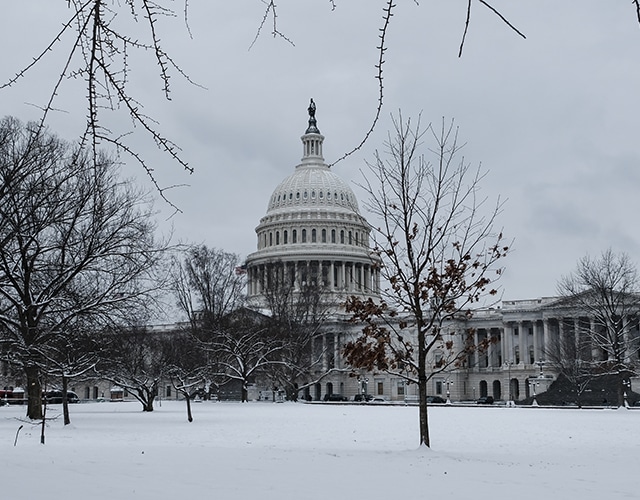Lawmakers on the House Ways and Means Committee achieved a feat Jan. 19 after debating something that rarely comes together in an election year: bipartisan tax legislation.
Earlier that week, a group of top Republicans and Democrats reached agreement on a $78 billion package that would expand a tax benefit that provides money to parents and restore three popular expired business tax breaks. That combination offers both parties an opportunity to claim wins as voters begin to head to the polls before the election in November.
The House Ways and Means Committee approved the package, 40-3, with overwhelming bipartisan support — a good but not definitive sign for the bill’s prospects in the broader House. All Republicans on the committee voted in favor of the bill, and only three Democrats dissented.
Rep. Jason Smith, R-Mo., chair of the committee, said in his opening statement that the bill was a sign that bipartisan legislation was possible in a divided Congress.
“When we travel back to our districts next week,” Smith said, “we can show our constituents who are struggling with inflation and high interest rates that when Congress works together, we can still achieve big things: bipartisan tax relief that grows wages, supports better jobs, gives families more breathing room and keeps America competitive on the world stage.”
Democrats pushed to further bolster the child tax credit, but all three amendments they offered to do so were rejected by Republicans, who hold the majority on the committee. Democrats had proposed expanding the child tax credit to 2021 levels, making the credit fully refundable and distributing the credit in monthly advance checks instead of the current annual payments.
Still, most of the committee’s Democrats decided to accept a narrower increase of the child tax credit for now. Three Democrats — Reps. Lloyd Doggett of Texas, Linda Sanchez of California and Gwen Moore of Wisconsin — voted against approval.
The deal, Doggett said, “is not a 50-50 split between children and corporate power.”
He added, “Once again, this committee is saying its priority is clear, and it’s certainly not children.”
The legislation still faces a murky path through Congress, but tax writers are racing to pass it before the official 2023 tax filing season kicks off Jan. 29.
The agreement on a tax bill could foreshadow the kinds of trade-offs that lawmakers will face next year, when many other provisions of the 2017 tax law begin to expire. This package remains a work in progress, but here is a look at what it includes.
An Expanded Child Tax Credit
In 2021, in the midst of the coronavirus pandemic, President Joe Biden and Democrats in Congress temporarily beefed up the child tax credit, allowing most families to receive checks of up to $3,600 per child. That amount reverted to $2,000 per child in 2022, and the money was no longer directly deposited into bank accounts. Instead, qualifying families were able to receive a tax credit as part of their regular federal tax filing to the IRS.
The proposal under consideration in Congress aims to make the program more generous. It would phase in an expansion of the credit by allowing it to grow along with the rate of inflation and would make more of it refundable. That means families would be able to claim the full credit even if they owe little or even nothing in federal taxes.
Democrats have been agitating to expand the program, which was found to have reduced poverty during the pandemic. The left-leaning Center on Budget and Policy Priorities projected that the changes, which would apply for tax years 2023, 2024 and 2025, would lift as many as 400,000 children above the poverty line in the first year.
Still, some Democrats want a more generous expansion and are pushing for changes including a return to monthly checks instead of the current annual payment that families can receive when they file their tax returns. The White House’s initial reaction to the deal suggested that Biden would prefer a greater expansion to the child tax credit, but Democrats are unlikely to oppose a narrower increase.
The expansion is estimated to cost $33.5 billion over three years.
A Boost for Affordable Housing
The package would also increase the amount of federal money that states can receive to encourage the development of low-income housing. The legislation would authorize a 12.5% increase for the federal Low-Income Housing Tax Credit, which was originally meant to subsidize up to 70% of construction. The credit is generally reserved for the development of new properties that do not use other federal subsidies.
The deal would also lower the proportion of a building that must be financed by municipal bonds to 30% from 50% in order for its developer to qualify for the credit. Proponents argue that lowering the bond threshold would spur development by allowing states to spread their bonds over more projects. Both changes would last through 2025.
The provisions represent a major increase in resources for affordable housing and would help develop more than 200,000 additional affordable housing units, according to estimates.
Sen. Maria Cantwell, D-Wash., insisted the measures — both of which were in a broader bipartisan bill she introduced to revise the low-income housing tax credit — be included in the tax deal.
“By doing this, we’re putting out the most cost-effective way to house people. It’s stimulative to the economy, and it helps with inflation,” Cantwell said, calling the measures the “most significant shot in the arm in 35 years” for affordable housing.
The measures are estimated to cost $6.2 billion over 10 years.
Tax Breaks for Companies
The bill restores lucrative corporate tax breaks ushered in by the 2017 tax law that had either expired or were set to expire in the next several years.
Among those are immediate deductions for domestic research costs that would otherwise need to be spread out over a five-year period. The bill also restores full and immediate deductions for capital expenses — like new factories and equipment — and eases limitations on deducting interest expenses.
Those deductions were intentionally phased out in order to contain the estimated $1.5 trillion cost of the 2017 tax law. But many economists and political analysts had predicted the credits would ultimately be extended, given that they benefit some of the biggest U.S. companies.
The left-leaning Institute on Taxation and Economic Policy criticized the changes under discussion as a corporate giveaway, saying they would benefit profitable companies such as Google, Apple and Meta that already pay too little in taxes. However, many Democratic lawmakers appear to be ready to accept this as a trade-off for expanding the child tax credit and the affordable housing subsidy.
Reinstating the tax benefits for businesses is projected to cost $32.8 billion over a decade.
A Tax Treaty for Taiwan
The bill includes a version of legislation that the Senate Finance Committee passed last year that would deepen economic ties between the United States and Taiwan. It would effectively create a tax treaty that is intended to pave the way for more Taiwanese investment in the U.S. semiconductor industry.
The legislation would end double taxation between the United States and Taiwan, which has strained business ties for years. Currently, Taiwanese companies and people doing business in the United States are taxed in both the United States and in Taiwan. U.S. companies operating in Taiwan are also taxed in both places, making cross-border investments more costly.
The legislation would not come into effect until Taiwan provides the same benefits to end double-taxation of Americans with income subject to tax there.
If enacted, the measure would allow Republicans and Democrats to demonstrate their support for Taiwan at a moment of heightened tension with China, which considers the island part of its territory.
Offsetting Tax Cuts by Ending a Separate Credit
To pay for the tax bill, lawmakers have proposed halting a pandemic-era employer tax benefit that has been a magnet for fraud and cost the federal government billions more than had been projected.
The Employee Retention Credit, created in 2020 and expanded in 2021, was intended to encourage companies that were struggling during the pandemic to keep employees on their payrolls.
It was initially projected to cost the federal government $85 billion. But widespread abuse has bloated that tab and, as of late last year, the government had paid out about $230 billion in refunds.
Businesses can continue making claims until next April, but the legislation under consideration would stop the program at the end of this month. That could produce savings of $78 billion, according to the Joint Committee on Taxation.
While that would cover the cost of the bill, at least on paper, budget watchdogs note that the overall price tag could actually be much higher. That is because many of the provisions in the bill, while confined to a certain period of time, are likely to be extended by lawmakers when taxpayers begin to fret about their tax bills increasing.
“Even with these offsets, this package will add to the deficit over the next few years and could set the stage for substantially more debt over time,” said Maya MacGuineas, the president of the Committee for a Responsible Federal Budget.
c.2024 The New York Times Company. This article originally appeared in The New York Times.







